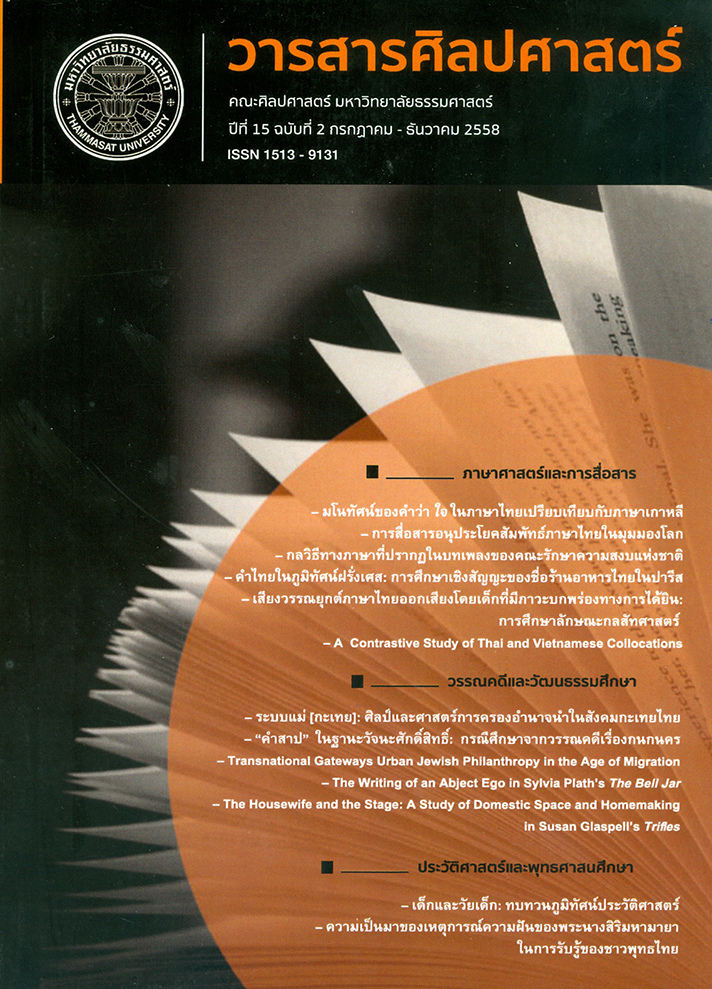เด็กและวัยเด็ก: ทบทวนภูมิทัศน์ประวัติศาสตร์
Main Article Content
บทคัดย่อ
บทความนี้มุ่งถกเถียงเกี่ยวกับภูมิทัศน์ทางความรู้ด้านประวัติศาสตร์เด็กและวัยเด็กในวงวิชาการต่างประเทศและวงวิชาการไทย เนื้อหาหลักแบ่งเป็นสองส่วน ส่วนแรกศึกษาภูมิหลังและข้อถกเถียงสำคัญของการศึกษาประวัติศาสตร์เด็กและวัยเด็กในวงวิชาการต่างประเทศ 2 ประการ ได้แก่ (1) ข้อถกเถียงว่าด้วยการรับรู้ถึงความแตกต่างระหว่างเด็กกับผู้ใหญ่ และ (2) ข้อถกเถียงว่าด้วยวัยเด็กในฐานะธรรมชาติของมนุษย์หรือประดิษฐกรรมทางวัฒนธรรม นอกจากนี้ยังเสนอความเป็นไปได้ในการศึกษาประวัติศาสตร์เด็กและวัยเด็กแบบสหวิทยาการ โดยชี้ให้ เห็นประโยชน์และความท้าทายบางประการจากการศึกษาประวัติศาสตร์แนวใหม่อย่าง “ประวัติศาสตร์โลก” และ “ประวัติศาสตร์เชิงลึก” ส่วนที่สองศึกษาสถานะ ข้อถกเถียง และข้อจำกัดของประวัติศาสตร์เกี่ยวกับเด็กและวัยเด็กในวงวิชาการไทย แม้อุดมการณ์ชาตินิยมที่ตระหนักถึงความสำคัญของเด็กในฐานะ “อนาคตของชาติ” จะหล่อเลี้ยงความสนใจของผู้คนที่มีต่อเด็ก แต่การศึกษาประวัติศาสตร์เด็กและวัยเด็กในสังคมไทยยังเป็นอาณาบริเวณที่ยังไม่ค่อยมีผู้ศึกษามากนัก เด็กและวัยเด็กมักเป็นตัวประกอบในการศึกษาประวัติศาสตร์แขนงอื่นๆ เป็นหลัก งานวิจัยเชิงประวัติศาสตร์ที่สนใจศึกษาเด็กและ วัยเด็กโดยตรงยังคงให้ความสำคัญกับบทบาทของรัฐและชาติเป็นหลักเท่านั้น บทความนี้เสนอในบทสรุปว่า (1) การพิจารณาคำว่า “เด็ก” ใน 3 ความหมาย ได้แก่ เด็กทางกายภาพ เด็กทางปรัชญา และเด็กในความสัมพันธ์ทางสังคมในฐานะกรอบการวิเคราะห์ทางประวัติศาสตร์และ (2) พิจารณาสมมติฐานและวิธีวิทยาของการศึกษาประวัติศาสตร์เชิงลึก (Deep history) อาจเป็นจุดเริ่มต้นที่ดีและเป็นประโยชน์ต่อการก้าวข้ามข้อจำกัดทางองค์ความรู้ดังกล่าว
คำสำคัญ: ประวัติศาสตร์เด็กและวัยเด็ก ประวัติศาสตร์เชิงลึก ประวัติศาสตร์ไทย วัยเด็ก ฟิลิปป์ อาริแยส
This paper aims at discussing intellectual perspectives on the history of children and childhood in an International and Thai historical discipline. It is divided into two parts. First, the paper outlines a background and debates in the international historical scholarship. The two chief, if not central, debates needed to be singled out include (1) whether people from different societies distinguish the child from the adult and (2) whether childhood is a human nature or cultural constructs. The paper also argues for the possibilities studying history of children and childhood in an interdisciplinary manner by pointing out some merits and challenges of recent historical approaches, namely “World history” and especially “Deep history”. The second part elaborates the current state, debates, and limits of the history of children and childhood in Thailand. While a nationalist ideology, regarding children as “the future of nation,” has nourished people’s interest in children and childhood; it is that of Thai historical literatures which is comparatively little. Children and childhood have only played minor roles in other strands of history. Few others directly concerning the issue have focused merely on the role of state and nationalism. In its effort to overcome these hurdles, the paper concludes by contending that both (1) considering three meanings of the term “dek” [เด็ก]; physiological, philosophical, and social-relational as an analytical framework and (2) taking deep history’s assumption and methodology into consideration, might be very useful and beneficial for future research.
Keywords: History of children and childhood, Deep history, Thai history, Childhood, Philippe Ariès


